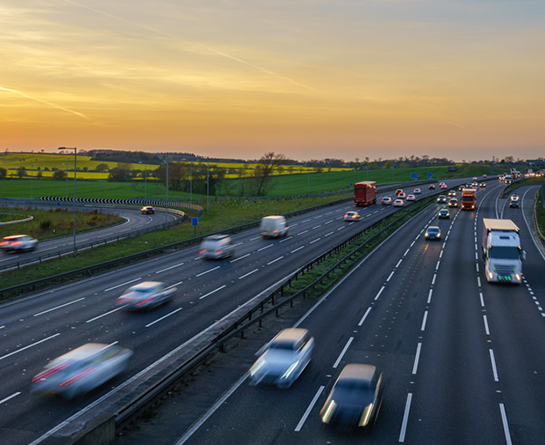Summary
Highways England called on our expertise to find feasible ways to deploy dynamic wireless power transfer (DWPT) systems on the strategic road network that are embedded beneath the road surface and provide continuous power to electric vehicles. Our in house specialist teams together with our international network of industry partners delivered a conclusive, independent report making a clear case for investment.
45% reduction in CO2 emissions per kilometre £350k - £425k cost per km to install a DWPT system on a motorway.
The Challenge
Electric vehicle (EV) development is advancing at speed. New models are continually launched in response to consumer demand for more efficient vehicles. The UK government is committed to investing in this field and to put the UK at the forefront for EV development and manufacture.
We led this project to investigate how to prepare our road network for increased use of electric vehicles. We had to investigate whether it is possible to have a reliable way of supplying continuous power to EVs, reducing fuel costs and installing and maintaining such solutions with minimal impact to the road surface.
Our approach
Given our previous extensive research in this field, we were able to quickly mobilise a specialist team of world leading experts, research institutes and manufacturers. This ensures that we will undertake a comprehensive and balanced evaluation of the feasibility.
Within TRL we were able to draw from our 50 strong transport technology team and 30 strong road design and construction team. They have in-depth technical understanding of pavement testing and construction, wireless power transfer technology, safety and operational requirements of highways.
Ian Thompson. Senior Technology Advisor, Highways England.
"I was the project sponsor for the feasibility study, and during the delivery of the work I found TRL support to be exemplary .Nothing was too much trouble, and would go to great lengths (literally!!) to prove arguments about the suitability of WPT.
I was on several occasions very challenging to TRLs findings and each time they were able to prove their case with sound arguments which were evidence based.
The final feasibility study report was a very readable document, particularly for wider stakeholders who may not understand the finer details of WPT technology. Since its publication on our website I have had requests for more information from all over the world, including USA and Australia.
Based on the outcomes of the study, Highways England is now planning to move to the next stage and start planning for off road trials of WPT technology."
The results
In our final report we clearly demonstrated the business case and benefits for introducing DWPT to our road network. We made recommendations that would support Highways England’s commitment to grow the use of electric vehicles with consideration for the communities that live near to our road network and high levels of air pollution.
By engaging with us on the project, Highways England gained access to our extensive research and knowledge, avoiding duplication of efforts and ensuring that knowledge transfer was implemented during the project

